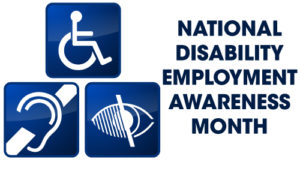As a building manager at Berkeley Lab, Betsy MacGowan has addressed many accessibility challenges on a case-by-case basis as new employees brought unique challenges to her attention. And as an architect in the Facilities Division, Misha Gonzalez is tasked with architectural system oversight and ADA compliance around the Lab. Together, the two women are the co-chairs of All Access, an Employee Resource Group (ERG) that is working to make our workplace and activities more accessible.
All Access’ mission is to create a welcoming and supportive environment for all employees and visitors and to serve as an information source for applicants, staff, recruiters, and managers who have questions about disabilities, support, and accommodations. The idea is that by making the Lab more accessible for some groups, it improves accessibility for all.

Betsy MacGowan, right, and Misha Gonzalez are co-chairs of the All Access Employee Resource Group. (Credit: Marilyn Chung/Berkeley Lab)
Berkeley Lab’s history and topography can make it a particularly challenging place to address some of these issues. “When you have so much history at a site, you get some bad with the good,” says Gonzalez. “Some of our pathways are probably as old as some of the more glamorous parts of our history.”
Some accessibility challenges are pretty simple to address — Gonzalez gives the example of a lever handle instead of a traditional doorknob making access much easier for a user with limited mobility. Others aren’t so straightforward, given the hillside location of our campus.
All Access recently rolled out a new initiative that will address the accessibility of the Lab’s many conference rooms by creating a database of their accessibility features. This information would be added to the IT Division’s existing Chrome extension that provides detailed information on each conference room. Conference rooms will eventually all have a “rating” distinguishing how easy they are to access.
Closed captioning is another service that All Access is exploring. They’re looking at options for using this service in the Building 50 auditorium, given its frequency of use and large audiences. Eventually they hope to make closed captioning available for other events around the Lab.
“Closed captioning is another one of those features that goes beyond its initial intended audience,” says MacGowan. “When you make something more accessible for those who are hearing impaired, it can help others as well — it can make it easier for people who aren’t native English speakers to understand; it might make it easier for remote attendees to understand; and it can help those with learning differences follow along more easily.”
She goes on to add: “We’ve also talked about things like having an app for folks to use while onsite at the Lab so that they can easily find out what accessibility features are available to them at various locations around the campus.”
The All Access ERG, whose executive sponsor is Associate Lab Director Kathy Yelick, was formed two years ago and currently has 70 members. The group holds monthly meetings and organizes events and speakers throughout the year, with many focused in October for National Disability Employment Awareness Month.
This year, MacGowan and Gonzalez attended the US Business Leadership Network conference, where they were inspired by the presentations and workshops on disability inclusion in the workplace. “It really helped us realize that accessibility is a journey, not a destination,” says Gonzalez. “Even if one day we have everything checked off on our to-do list, there are and should always be more that we can tackle.”
About Berkeley Lab Employee Resource Groups
All Access is one of four employee resource groups (ERG) at the Lab, the others being the Veterans ERG, African-American ERG, and the Lambda Alliance ERG. ERGs are associations of employees who are organized around a primary diversity dimension and work on furthering the Lab’s business goals through strategic initiatives, deliverables, and policy-related goals stated in their annual charter. ERGs are open to all Berkeley Lab employees. You do not need to identify as a member of these groups to join an ERG.
All Access is sponsoring the following events this month:
Disability Rights Education and Defense Fund (DREDF) Executive Director Susan Henderson
Wed., Oct. 18
Noon to 1 p.m
Bldg. 59 (Wang Hall) Room 3101
DREDF Executive Director Susan Henderson and DREDF staff will discuss their experiences with disability rights. Founded in Berkeley in 1979, DREDF is a leading national civil rights law and policy center directed by individuals with disabilities and parents who have children with disabilities.
“Fixed” Documentary
Tue., Oct. 24
Noon to 1 p.m.
Bldg. 59 (Wang Hall) Room 3101
Showing of the documentary “Fixed,” which questions commonly held beliefs about disability and normalcy by exploring technologies that promise to change our bodies and minds forever. Told primarily through the perspectives of five people with disabilities: a scientist, journalist, disability justice educator, bionics engineer, and exoskeleton test pilot, FIXED takes a close look at the implications of emerging human enhancement technologies for the future of humanity. For example, what does “disabled” mean when a man with no legs can run faster than most people in the world?
Autism Awareness Talk
Mon., Oct. 30
Noon to 1 p.m.
Bldg. 54 (Perseverance Hall)
Hosting an autism awareness Brown Bag Lunch: This talk will cover information about the autism spectrum and the benefits of enhancing an organization’s neurodiversity; general tips for hiring managers interviewing applicants or working with colleagues on the spectrum; and success stories of companies who have participated in the Autism Advantage program.

